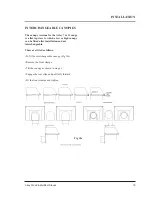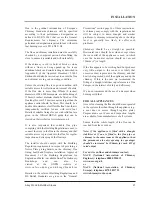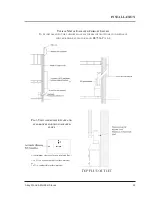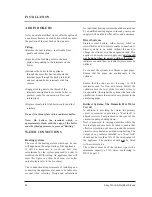
FUEL TYPES
Wood-
Any type of wood is suitable provided it is
well seasoned and has a moisture content below
20%. This usually implies that the timber has been
suitably stored to allow moisture to evaporate for at
least nine months in the case of soft woods, and at
least eighteen months in the case of hard wood. We
recommend that for general burning, wood should
be split into logs of no more than 130mm (5")
diameter.
Larger logs can be used for overnight burning.
WARNING
wet wood must not be used as this will
greatly contribute to the creation of tar and creosote
which may, in extreme cases, run down the
chimney in liquid form. This will seriously damage
both the chimney and the appliance, and increase
the risk of chimney fire.
Note: If you have sticky tar inside the appliance or
chimney your wood is 'Green' or too wet.
Recommended Reading:
"Wood as Fuel" available from the Forestry
Commission.
Peat-
Can be used in turf or briquette form, but
again the moisture content must be low.
Paper-
paper will burn successfully. Burn dry
paper only or chimney damage will occur.
NEVER BURN PLASTICS OR WASTE IN
YOUR STOVE.
Coal
-
Household coal produces a large amount of
ash and smoke. If used the appliance and chimney
will require frequent cleaning. Therefore soft house
coal is
not
recommended.
Recommended fuels are as follows:
The Hetas Ltd, "Three Tick" appliance approval
only covers the use of the following fuels in this
appliance; Phurnacite, Phurnacite Plus,
Centurion, Maxibrite, Extracite, Pureheat,
Blazebrite, Taybrite, Sunbrite (Doubles/Singles),
Anthracite (Large Nuts), and Welsh Dry Steam
Coal (Large/Small Nuts).
Approval does not cover the use of other fuels
either alone or mixed with the suitable fuels listed
above, nor does it cover instructions for the use of
other fuels.For latest details please refer to Hetas
website www.hetas.co.uk.
Do not use smaller sizes than Stovesse, e.g.
Beans, Peas,Grains.
Do not use petroleum based solid products such
as Calco or Petrocoke.
To do so will invalidate the appliance guarantee
LIGHTING THE FIRE
Prior to lighting the fire for the first time check
with the installer that:
•Installation and all building work is complete.
•The chimney is sound and has been swept and is
free from obstruction.
•Adequate provision for combustion air has
been made, i.e. a permanent vent of at least
550mm² per kW of rated output above 5 kW,
is fitted in the room in which the appliance
is installed.
•That Building Regulations and any local
by-laws have been followed during installation
(see installation instructions).
•All firebox liner panels are in place.
•Throat plate is in place.
•Where add in boilers are fitted ensure that the
system is full of water and vented, and
precautions have been taken to prevent corrosion
(see installation Instructions).
•That the chimney draw has been checked and is
within specification. With the chimney warm the
draught should be between 1 - 2mm water gauge
(0.1 - 0.2mbar).
WARNING:
An over drawing chimney can cause
over-firing resulting in damage to the appliance.
WARNING - ADD IN BOILERS
: Do not light the
fire if it is suspected that any part of the water
system is frozen.
Arley Wood & Multifuel Stoves
11
OPERATING INSTRUCTIONS












































